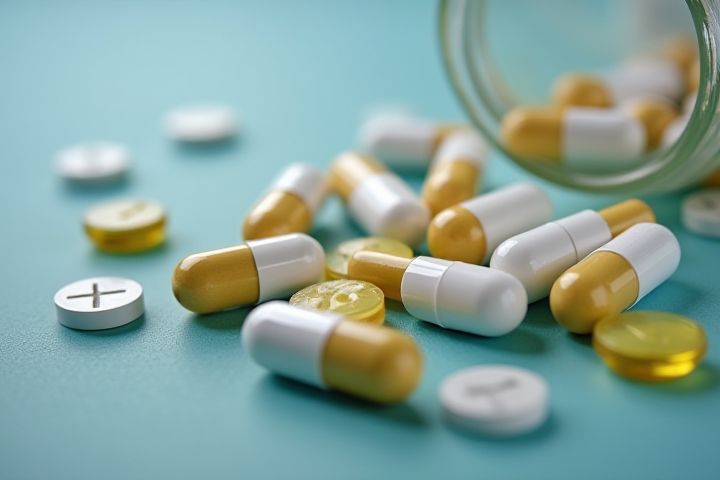
The pharmaceutical industry in Nigeria plays a crucial role in the healthcare sector, generating significant revenue and providing essential medications to the population. Numerous local and international companies produce a wide range of healthcare products, including vaccines, antibiotics, and antiretroviral drugs. Nigeria's robust market dynamics, fueled by increasing healthcare demands and a growing population, offer numerous investment opportunities for stakeholders. Regulatory bodies, such as the National Agency for Food and Drug Administration and Control (NAFDAC), ensure quality standards and safety in pharmaceutical products. As you explore opportunities within this sector, be mindful of the challenges posed by counterfeit medicines and the need for improved supply chain management.
Regulatory authority: NAFDAC
In Nigeria, the National Agency for Food and Drug Administration and Control (NAFDAC) serves as the regulatory authority overseeing the pharmaceutical industry, ensuring the safety and efficacy of drugs and medical products. NAFDAC operates through rigorous scientific assessments and often collaborates with international organizations to align local practices with global standards. By maintaining strict guidelines for product registration, manufacturing, and distribution, NAFDAC plays a crucial role in protecting public health. As a pharmaceutical professional or stakeholder, it's essential to stay informed about NAFDAC regulations to ensure compliance and promote safe healthcare solutions in the Nigerian market.
Limited local manufacturing
In Nigeria, the pharmaceutical industry is characterized by limited local manufacturing capabilities, which significantly impacts the availability and affordability of medications. Many essential drugs are imported, leading to increased costs and supply chain vulnerabilities. Government initiatives are underway to boost local production, aiming to enhance self-sufficiency and reduce reliance on foreign pharmaceuticals. You may encounter challenges in accessing medications due to these manufacturing limitations, highlighting the importance of advocating for improved local production strategies.
Import-dependent market
The pharmaceutical sector in Nigeria heavily relies on imported medicines and active pharmaceutical ingredients, leading to a significant trade imbalance. Over 70% of the country's pharmaceutical products are sourced from international manufacturers, impacting local production capacity and innovation. This import dependence often results in higher medication costs and supply chain vulnerabilities, limiting accessibility for the Nigerian population. Strengthening local manufacturing capabilities and regulatory frameworks could enhance self-sufficiency and improve health outcomes for your community.
Counterfeit drug issues
The pharmaceutical industry in Nigeria is increasingly addressing the pervasive issue of counterfeit drugs, which significantly undermines public health. Regulatory agencies like the National Agency for Food and Drug Administration and Control (NAFDAC) are implementing stringent measures, including increased surveillance and enhanced drug quality assessments. Innovative technologies, such as blockchain and serial number tracking, are being utilized to ensure authenticity and safeguard the supply chain. As a result, efforts to combat counterfeit medications not only protect consumers but also enhance the overall credibility of the Nigerian pharmaceutical sector.
Essential Medicines List
The pharmaceutical industry in Nigeria emphasizes the Essential Medicines List (EML), a crucial framework launched by the World Health Organization to ensure the availability of necessary medications for public health. This list prioritizes drugs that address prevalent health issues, including communicable and non-communicable diseases, thereby improving health outcomes for the Nigerian population. By focusing on affordability and accessibility, pharmaceutical companies actively contribute to national health policies and programs aimed at reducing healthcare disparities. Your understanding of the EML can enhance your engagement with local healthcare initiatives and patient care strategies.
Market growth potential
The pharmaceutical market in Nigeria is experiencing significant growth potential, driven by a rising population and increasing healthcare demands. With an expanding middle class and greater awareness of health issues, local and international companies are investing in drug development and distribution. The government's initiatives to improve healthcare infrastructure and reduce reliance on imported medications further stimulate market opportunities. You can leverage this growth by staying informed about regulatory changes and emerging health trends that shape the industry landscape.
Government healthcare initiatives
In Nigeria, the pharmaceutical sector increasingly aligns with government healthcare initiatives aimed at improving public health outcomes. Key programs address diseases such as malaria, tuberculosis, and HIV/AIDS, promoting access to essential medications. Local manufacturers are encouraged to collaborate with government agencies to ensure high-quality production and distribution of pharmaceuticals. As you engage with Nigeria's healthcare landscape, understanding these government-driven initiatives can enhance your strategic decisions in the pharmaceutical industry.
Patent law challenges
The pharmaceutical industry in Nigeria faces significant challenges related to patent law, impacting innovation and access to medications. Navigating the complex landscape of intellectual property rights is crucial for local manufacturers, as strict patent protections can hinder the production of generic drugs and increase treatment costs. Your understanding of these legal frameworks is essential for advocating policy reforms that promote both patent protection and public health interests. Furthermore, the interplay between international trade agreements and local patent legislation adds another layer of complexity to the sector, highlighting the need for robust legal strategies and industry collaboration.
Increasing foreign investment
Nigeria's pharmaceutical sector is increasingly attracting foreign investment due to its expansive market potential and strategic geographic location in West Africa. Government policies that incentivize foreign collaboration and local production are crucial in enhancing the industry's growth trajectory. The country's diverse population presents significant demand for a wide range of medications, creating ample opportunities for international pharmaceutical companies. By investing in Nigeria, you can tap into a burgeoning market while contributing to improving healthcare access and developing local production capabilities.
Generic drug adoption trend
The pharmaceutical industry in Nigeria is witnessing a significant shift towards the adoption of generic drugs, driven by increasing healthcare access and affordability concerns. With the government's support for local production and the implementation of policies to promote generic medications, market competition is intensifying. This trend not only enhances the availability of essential medicines but also fosters innovation and economic growth within the sector. As a consumer, you can benefit from lower costs while receiving effective treatments tailored to your healthcare needs.
